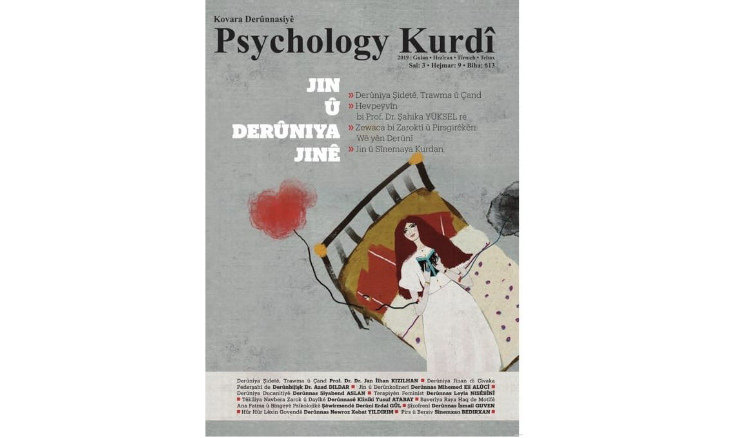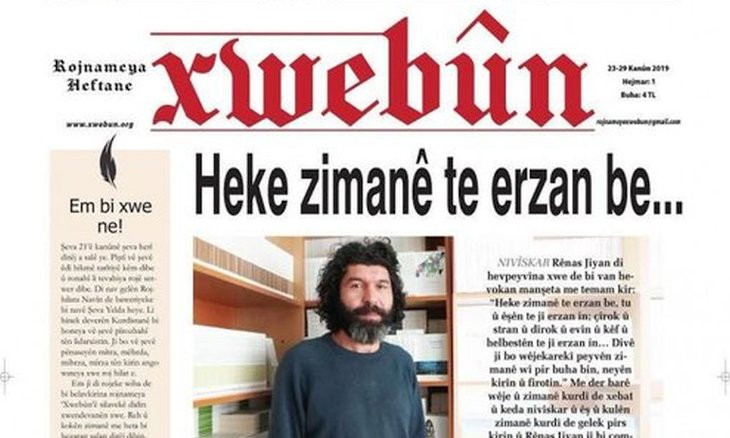'Psychology Kurdi' aims to help Kurdish becoming a scientific language
In publication since 2016, Psychology Kurdi is the first magazine to cover the discipline of psychology from the perspective of the Kurdish language. It provides a place for important articles on the trauma that Kurds have experienced. "Our purpose is to open the door for Kurdish as a scientific language to be used in the field of psychology," says the magazine's editor Abdulsıttar Özmen.
Ferhat Yaşar/ DUVAR
In publication since 2016, Psychology Kurdi is the first magazine to cover the discipline of psychology from the perspective of the Kurdish language. It provides a place for important articles on the trauma that Kurds have experienced.
The magazine's editor Abdulsıttar Özmen, who holds an MA in Kurdish Languge and Literature, says that the psychological phenomena commonly experienced by Kurds, including themes of identity, belonging, discrimination, violence, societal trauma, social solidarity and the concept of resistance are intrinsically linked to Kurds' historicity.
In Turkey, Kurdish is the most commonly-spoken language after Turkish. In the past, Kurdish was outlawed and those caught speaking it were punished. However, in spite of policies of assimilation, the language protected its wealth. In spite of being a rich language, there are still certain circles that claim Kurdish is neither a scientific nor an educational language and oppose mother tongue education while defending policies of assimilation. With things as they are, Kurds are trying to fill a major void in the areas of modern law and science.
Özmen said that the idea for releasing the magazine came from his friends who work as psychologists. Rather than being a 'first' in its field, Özmen was more concerned with the magazine's principles and proceeded accordingly.
“The existing [Kurdish-language] magazines are mostly based around literature, language and history. They are filling important voids in their own areas. We also saw that there was a major void in this area and in order to fill it we embarked upon a serious study. When we talk about a void, we mean the lack of usage of Kurdish in the field of psychology, the lack of the establishment of the relevant terminology, and the problems that arise as a result,” Özmen said.
“As such, people are hesitant to write. As long as people don't write and don't try to address this, naturally this void cannot be filled. Our purpose is to get in front of this and open the door for Kurdish as a scientific language to be used in the field of psychology. Of course, when we talk about Kurdish we should mention that we are in particular referring to the Kurmanci dialect,” Özmen, referring to the most common of the Kurdish dialects.
The Psychology Kurdi magazine has benefitted from great interest on social media as well as news agencies. The 10th issue will be released soon, but Özmen said he still has not seen a serious written critique of the magazine, be it positive or negative, regarding the content of the articles, the language or the style of the magazine.

“Everyone says that were are doing good work but this is not what we need to hear. One would wish that we could move forward with the responses we receive from readers and address deficiencies if there are any, Özmen said.
Distribution problem
One common problem faced by magazines and books published in Kurdish is a lack of sufficient distribution, according to Özmen.
“All Kurdish publishing houses have difficulty distributing apart from a few places in a number of cities (Istanbul, Diyarbakır, Ankara, Van, Mardin and Batman). Of course there are a number of understandable reasons for this,” Özmen said, adding that the magazine can be purchased the following locations: Medya Kitabevi in Istanbul's Beyoğlu district, Destar Kitap Cafe in Ankara's Kızılay district, Ajans JJ, Pirtuka Kurdi, and Lilav Kitabevi in Diyarbakır's Ofis district, Lorya Yayıncılık-Kitaba Kurdi in the center of Van, Leylan Kitap Cafe and Zend Kitabevi in Mardin, Benav Kitabevi in Nusaybin, and Mawa Kitap Cafe in Kızıltepe.
It can also be ordered online and shipped to other cities or internationally from www.pirtukakurdi.com, www.kitabakurdi.com, and www.kurtcekitap.com.
 Kurdish weekly Xwebûn starts publication
Kurdish weekly Xwebûn starts publication
